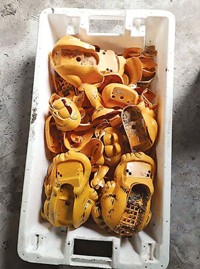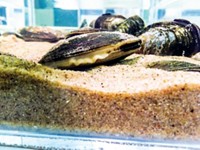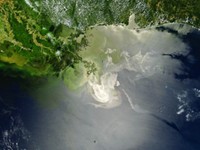Advertisement
Grab your lab coat. Let's get started
Welcome!
Welcome!
Create an account below to get 6 C&EN articles per month, receive newsletters and more - all free.
It seems this is your first time logging in online. Please enter the following information to continue.
As an ACS member you automatically get access to this site. All we need is few more details to create your reading experience.
Not you? Sign in with a different account.
Not you? Sign in with a different account.
ERROR 1
ERROR 1
ERROR 2
ERROR 2
ERROR 2
ERROR 2
ERROR 2
Password and Confirm password must match.
If you have an ACS member number, please enter it here so we can link this account to your membership. (optional)
ERROR 2
ACS values your privacy. By submitting your information, you are gaining access to C&EN and subscribing to our weekly newsletter. We use the information you provide to make your reading experience better, and we will never sell your data to third party members.
Environment
Scientists Use Social Networking To Study Spill
by Bethany Halford
June 14, 2010
| A version of this story appeared in
Volume 88, Issue 24
Watching news coverage of the Deepwater Horizon oil spill, chemists Adam Braunschweig, Mark Olson, and Amy Scott felt an overwhelming sense of helplessness. “We were sitting around talking about how we don’t know what kind of chemicals and surfactants they’re using,” Scott recalls, “and Adam just came up with this idea: Why don’t we test the water ourselves?” After all, she says, “we have the skills and the knowledge, and we have instruments lying around. Why can’t we do this?”
COVER STORY
Scientists Use Social Networking To Study Spill
So the three young scientists—all recent doctoral graduates—decided to establish Project Tantalus, an effort to collect and analyze water samples from the Gulf region and beyond aided by the power of Facebook.
For most researchers, Facebook is a place to turn when you want to kill a little time between experiments. It’s not typically used as a research tool. But Braunschweig, Olson, and Scott realized that they were going to have to raise a small army if they wanted to collect water quickly from such a vast area. In today’s digital age, what better way to do that than through Facebook?
With Facebook, Braunschweig explains, “you can spread your ideas to a large group of people, and you can ask that group of people to gather information that would otherwise be impossible to get.” In this case, that information is water samples. “The situation changes from day to day, and we hope to monitor those changes,” he says. “If we were trying to mobilize a group of people any other way, we wouldn’t have an early snapshot. It would just take too long to get samples before things change.”
Although it’s just getting off the ground, Project Tantalus has a pretty ambitious goal: to collect 100,000 water samples from regions that have been or may be affected by the spill, including the Gulf of Mexico, the Caribbean, and the entire east coast of the U.S. The team is asking that participants collect at least six different samples of 5 mL each, taken at least 12 hours apart. Sample labels, which call for the date and time of collection, the longitude and latitude of the collection site, and a participant-generated random identification code can be found on Project Tantalus’ Facebook page.
Depending upon location, the samples are sent to Braunschweig or Olson, who are about to start their own research labs at New York University and Texas A&M University, Corpus Christi, respectively. Scott, currently a postdoctoral fellow at Argonne National Lab, will be starting a postdoctoral fellowship at Columbia University in the fall.
The name Project Tantalus, incidentally, is derived from the Greek myth of King Tantalus, whose behavior at a dinner party thrown by the gods so angered his hosts that he was tied to a tree standing in a pool of water. Whenever he would bend over to take a drink, the water would recede, leaving him with an unquenchable thirst.
“The name is meant to get across the message that we’re thirsty. Like Tantalus, all we want is water,” Brauschweig says. “Our first goal is just to get people to send us samples from their backyards, and then we hope to develop some tests to see whether we can find some chemicals that are characteristic of the spill.” If those prove to be successful, he says, “we could potentially track the movement of these chemicals. So it’s an opportunity to do some very interesting science and gain a lot of information that maybe others could use.”
“For the majority of the population, you can’t do anything” about the oil spill, Olson tells C&EN. “This is an opportunity, I think, for people to get involved and be part of the larger picture.” And if Project Tantalus turns out to be a success, he adds, social-networking sites such as Facebook could become regular research tools. “I think it’s really far-fetched to assume that this is going to be the last ecological disaster of this magnitude. Who knows what’s going to happen in the future? If we have something set up that’s pretty robust and efficient, I think we could probably do great things with it,” Olson says.
“This is exactly why you’re trained as a scientist,” Scott adds. “As a chemist, I feel that I have an obligation to protect our environment from harmful chemicals and pollutants. I think that it’s important that this information gets out to everyone so people know exactly what they’re swimming in or drinking, and along the way I’ll learn some new science.”





Join the conversation
Contact the reporter
Submit a Letter to the Editor for publication
Engage with us on Twitter